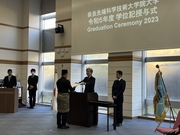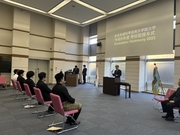イベント報告 2023/12/26
12月22日(金曜日)、学際融合領域研究棟2号館1階研修ホールにおいて学位記授与式を挙行しました。
授与式では、塩﨑一裕学長から修了生に学位記が手渡され、門出を祝して英語で式辞が述べられました。
また、当日は、式典の模様をインターネットによりリアルタイムで配信したほか、式典終了後の会場を記念撮影のために開放し、修了生たちは和やかな雰囲気のもと歓談し、喜びを分かち合いました。
※ 今回の修了生の内訳は、以下のとおりです。
【博士前期課程修了者】
先端科学技術研究科 1名〈うち留学生 1名〉
【博士後期課程修了者】
先端科学技術研究科 6名〈うち留学生 4名〉
計 7名(うち留学生5名)
【Congratulatory Remarks to Graduating Students】
President's Commencement Address (December, 2023)
It is with immense pleasure that I extend my warmest congratulations to each and every one of you who has received master's or doctoral degrees today. Your everyday effort that has led you to this commencement ceremony is truly an accomplishment of hard work and worthy of praise. I hope you will be proud of yourselves and keep the joy of this day in your hearts.
I would also like to extend my heartfelt congratulations to your family and friends, as well as your professors, who have been diligently guiding you through your studies. It must be a great joy for all who have supported your studies at NAIST in various ways.
Having completed your study at NAIST, you now know that training in graduate school is very different from what you received as an undergraduate. Graduate education is centered around research training, where you work on your own research project and compile a dissertation. Here, I have a question for you. Has your image of "scientific research" changed by experiencing your thesis research and observing professional researchers such as your professors?
In the stereotypical image of research for the public, scientific insight occurs all of a sudden, for example, when a scientist sees an apple falling from a tree. A moment of eureka is often illustrated as a light bulb being lit in the head of a lone scientist. But now you probably understand that research is a time-consuming process usually carried out by the collaboration of many scientists over the years.
Research is teamwork. You share your initial idea or finding with peers, who often disagree with you, so that you can make adjustments. Your conference presentation and paper publication would lead to even more scrutinization by many researchers, allowing further refinements. Eventually, your idea may become a long-standing theory, or your finding may become "knowledge." Such a scientific process could take hundreds of years and involve numerous researchers, with the heliocentric theory being a famous example.
Why do scientists need to work in teams? Herbert Simon was an American political scientist who was awarded the Nobel Prize in Economics in 1978. In his book titled Administrative Behavior, he coined the famous term "bounded rationality" for the idea that our rationality in making decisions is limited by what we have, such as our cognitive capability and available time. Without a doubt, individual scientists also have only "bounded rationality," rather than "perfect rationality" necessary to reach objective truth instantly. That is because what we think and see is personal, being influenced by our backgrounds, experiences, education, and state of mind. Only researchers' collective wisdom and passion can attain scientific consensus, which is often called "knowledge."
None of our current challenges, such as climate changes, pandemics, and SDGs, can be addressed by a single expertise. They demand the close collaboration of diverse researchers and global citizens, leading to recent attention to "intellectual humility." The concept of intellectual humility is nothing new. Its origin can be referred to the famous saying by the ancient Greek philosopher Socrates, "I know that I know nothing." Intellectual humility is the quality of accepting the limitations of one's beliefs and, therefore, recognizing one's "bounded rationality." Embracing our fallibility makes us open to the perspectives of others and ready for collaboration. Only by recognizing that our comprehension might be flawed or limited can we listen to others and wade into the unknown to make discoveries and create innovations.
The graduate degrees you have been awarded today are remarkable achievements you should be proud of. On the other hand, academic arrogance is what we should always be afraid of, and "intellectual humility" is the last item that I would like you to keep in mind on this graduation day. It is a skill or habit essential for leaders who tackle global challenges with integrated efforts of diverse members of society. Indeed, there is an excellent proverb that the Japanese food culture has conceived for us to remember "intellectual humility":
Before closing, I would like to congratulate all of you again and remind you that you are part of the NAIST community even after graduation. The NAIST Alums Association is a global network of over 10,000 alums, and I encourage you to take advantage of it and keep in touch with NAIST. With great pride, we will enjoy learning about your achievements and accomplishments to come.
Go now and outgrow your limits!
奈良先端科学技術大学院大学学位記授与式(令和5年12月22日挙行)
【学長式辞】
※参考 日本語訳
本日、修士号または博士号を授与された皆さんに、心からのお祝いを申し上げます。この学位記授与式に至るまでの皆さんの日々の努力はまさに精励の賜物であり、賞賛に値します。ぜひ誇りを持って、この日の喜びを心に刻んで頂きたいと思います。
また、ご家族やご友人の方々、そして皆さんを熱心に指導してこられた先生方にも心よりお祝いを申し上げます。これまで奈良先端大での学びを様々な形で支えてきた全ての方々にとって、大きな喜びに違いありません。
本学での学びを終えた皆さんは、大学院での学修が学部時代のそれとは大きく異なることがお分かりになったと思います。大学院教育は、自らの研究課題に取り組み、論文をまとめるという研究・探究活動を中心とする学びです。ここで、皆さんに質問があります。自分自身が学位論文研究を経験したり、指導教員の先生方などプロの研究者と身近に接することで、「学術研究」というもののイメージは変わりましたか?
一般の方々にとっての研究の典型的なイメージでは、科学的な洞察が、たとえば木からリンゴが落ちるのを見た科学者に突然舞い降りてきます。ひらめきの瞬間が、一人で研究に取り組む科学者の頭の中で電球が点灯するように描かれることもよくあります。しかし、今の皆さんは、研究というものが、しばしば何年にもわたって多くの科学者の協力によって成し遂げられる、時間のかかるプロセスであることを理解しているのではないでしょうか。
研究はチームワークです。当初の思いつきや発見を、まずは同僚と共有することで、同意が得られない点を、改めることができます。これを学会で口頭発表、あるいは論文発表すると、多くの研究者にさらに精査され、結果としてもっと洗練されたものになっていきます。最終的には、あなたのアイデアや発見が長きに渡って信奉される理論になったり、いわゆる知識となったりするかもしれません。このような科学研究の過程は、多くの研究者を巻き込みながら数百年かかることもあり、その有名な例としては地動説の確立が挙げられます。
なぜ、科学者はそのようにチームワークで取り組む必要があるのでしょうか?1978年にノーベル経済学賞を受賞したアメリカの政治学者であるハーバート・サイモンは、Administrative Behaviorという著書の中で、「限定合理性」という有名な造語を使いました。この言葉は、私たちの意思決定の合理性が、自身の認知能力や利用可能な時間など、私たちが持っているものによって制限されているという概念を表す言葉です。個々の科学者も、客観的な真実に思いつきで到達できる「完全合理性」ではなく、「限定合理性」しか持っていないのは明らかです。なぜなら、私たち研究者が考えたり、見たりすることはあくまで一人の人間としての活動で、自身の経歴、経験、受けた教育、あるいはその時の心の状態に影響されるからです。研究者たちの集合的な知恵と情熱のみが到達できる科学的な合意こそが、しばしば「知識」と呼ばれるものになるのです。
気候変動、パンデミック、SDGsなど、私たちが現在抱えている課題はいずれも、単一の専門分野だけでは対処できません。それらの課題に対して多様な研究者それに世界中の人々が一緒になって取り組むことが求められている中で、「知的謙虚さ(intellectual humility)」が最近、注目されています。知的謙虚さという概念自体は決して新しいものではありません。その起源を、古代ギリシャの哲学者ソクラテスの有名な「無知の知」にみることもできるでしょう。知的謙虚さは、自らの信じることが必ずしも正しいとは限らない可能性を受け入れて、自身の「限定合理性」を認識する資質です。自分も誤りを免れることはできないということを受け入れれば、他の人の視点を取り入れて一緒に取組むことができるようになるものなのです。自分の理解に欠陥がある、または限界がある可能性を認識してはじめて、他人の意見に耳を傾け、自分が知らなかった領域に足を踏み入れて、発見や発明を生み出すことができるというわけです。
本日皆さんが授与された大学院の学位は、誇るべき素晴らしい成果です。一方で私たちは、学業・学問上の成功が傲慢さにつながらないよう常に心がける必要があります。この卒業の日に、最後に皆さんの心に刻んで頂きたいのは「知的謙虚さ」です。「知的謙虚さ」は、社会の多様なメンバーと一体となって連携し、グローバルな課題に取り組むリーダーに不可欠なスキルであり、習慣です。この「知的謙虚さ」を忘れないために、実は日本の食文化が生み出した素晴らしいことわざがあります:
「実るほど首を垂れる稲穂かな」
英語には似たような意味の「高貴な人ほど謙虚である」という美しいことわざがあるのをご存知かもしれません。おそらくこちらのほうが覚えやすいでしょう。
最後に改めてお祝いを申し上げるとともに、皆さんは卒業後も奈良先端大コミュニティの一員であることを覚えておいていただきたいと思います。奈良先端大の同窓会は 10,000名を超える卒業生から成る世界的なネットワークです。ぜひ積極的に活用していただき、本学とのつながりを持ち続けてください。私たちは、大きな誇りとともに皆さんの今後の成果や業績を伺う機会を楽しみにしています。
Go now and outgrow your limits!
2023年12月22日
奈良先端科学技術大学院大学
学長 塩﨑 一裕








